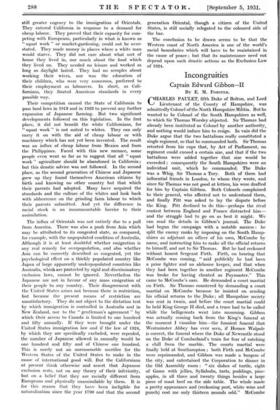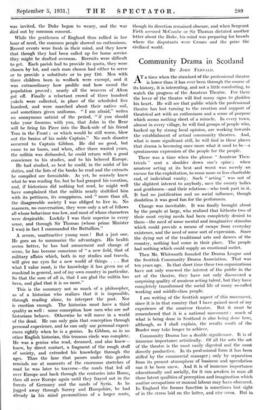Incongruities
Captain Edward Gibbon—II
BY E. M. FORSTER.
CHARLES PAULET, fifth Duke of Bolton, and Lord Lieutenant of the County of Hampshire, was admittedly Colonel of the North Hampshire Militia. But he wanted to be Colonel of the South Hampshires as well, to which Sir Thomas Worsley objected. Sir Thomas had already been instituted as Colonel by another authority, and nothing would induce him to resign. In vain did the Duke argue that the two battalions really constituted a single regiment, so that he commanded both. Sir Thomas retorted from his cups that, by Act of Parliament, no regiment could exceed a certain size, and that if the two battalions were added together that size would be exceeded ; consequently the South Hampshires were an individual unit, which he commanded. The Duke was a Whig, Sir Thomas a Tory. Both of them had influential friends in London, to whom they wrote, and since Sir Thomas was not good at letters, his were drafted for him by Captain Gibbon. Both Colonels complained to their general, who affected not to understand them, and finally Pitt was asked to lay the dispute before the King. Pitt declined to do this—perhaps the rival contest between England and France distracted him— and the struggle had to go on as best it might. We can read the details in Gibbon's journal. The Duke had begun the campaign with a notable success : he split the enemy ranks by imposing on the South Hamp- shires as adjutant an officer of his own, McCombe by name, and instructing him to make all the official returns to himself, and not to Sir Thomas. But he had reckoned without honest Sergeant Firth. Firth, on hearing that McCombe was coming, " said publickly he had been a prize fighter and an alehouse keeper, and that when they had been together in another regiment McCombe was broke for having cheated as Paymaster." This came to McCombe's ears. He demanded a court martial on Firth. Sir Thomas countered by demanding a court martial on McCombe because he insisted on sending his official returns to the Puke ; all Hampshire society was rent in twain, and before the court martial could be held King George II died, and a truce had to be called while the belligerents went into mourning. Gibbon was actually coming back from the King's funeral at the moment I visualize him—the funniest funeral that Westminster Abbey has ever seen, if Horace Walpole is correct, the funeral where the Duke of Newcastle stood on the Duke of Cumberland's train for fear of catching a chill from the marble. The courts martial were finally held at Southampton ; both Firth and McCombe were reprimanded, and Gibbon was made a burgess of the city, and entertained the Corporation to dinner in the Old Assembly room : " six dishes of turtle, eight of Game with jellies, Syllabubs, tarts, puddings, pine- apples, in all three and twenty things besides a large piece of roast beef on the side table. The whole made a pretty appearance and (reckoning port, white wine and punch) cost me only thirteen pounds odd." McCombe was invited, the Duke began to weary, and the war died out by common consent.
While the gentlemen of England thus rallied in her hour of need, the common people showed no enthusiasm. Recent events were fresh in their mind, and they knew that though they had been called up for home service they might be drafted overseas. Recruits were difficult to get. Each parish had to provide its quota, they were chosen by lot, and each man chosen had either to serve or to provide a substitute or to pay £10. Men with three children born in wedlock were exempt, and it was extraordinary how prolific and how moral the population proved ; nearly all the weavers of Alton got off. Finally a reluctant crowd of three hundred yokels were collected, in place of the scheduled five hundred, and were marched about their native soil, and sometimes given uniforms. " I am afraid," writes an anonymous satirist of the period, " if you should take your firearms with you, that John in the Rear will be firing his Piece into the Back-side of his friend Tom in the Front ; or which would be still worse, blow out the brains of his noble Captain." No such disaster occurred to Captain Gibbon. He did no good, but came to no harm, and when, after three wasted years, the militia was disbanded, he could return with a good conscience to his studies, and to his beloved Europe.
He had studied, as best he could, in the midst of his duties, and the lists of the books he read and the extracts he compiled are formidable. As yet, he scarcely knew what he was reading for, but he had grasped his vocation, and, if historians did nothing but read, he might well have complained that the militia nearly stultified him with its pettiness, its scrappiness, and " more than all, the disagreeable society I was obliged to live in. No manners, no conversation, they were only a set of fellows all whose behaviour was low, and most of whose characters were despicable. Luckily I was their superior in every sense, and through Sir Thomas (whose prime Minister I was) in fact I commanded the Battallion."
A severe, unattractive young man ! But a just one. He goes on to summarize the advantages. His health seems better, he has had amusement and change of scene, he has become conscious of " a new field, that of military affairs which, both in my studies and travels, will give me eyes for a new world of things. . . . But what I value most, is the knowledge it has given me of mankind in general, and of my own country in particular. So that the sum of all is, that I am glad the militia has been, and glad that it is no more."
This is the summary not so much of a philosopher, as of a historian* who realizes that it is impossible, through reading alone, to interpret the past. Nor is emotion enough. The historian must have a third quality as well : some conception how men who are not historians behave. Otherwise he will move in a world of the dead. He can only gain that conception through personal experience, and he can only use personal experi- ences rightly when he is a genius. In Gibbon, as in no other English historian, this tenuous circle was complete. He was a genius who read, dreamed, and also knew— knew, by direct contact, a fragment of the rough stuff of society, and extended his knowledge through the ages. Thus the lane that passes under this garden reminds me at moments of the enormous stretches of road he was later to traverse—the roads that led all over Europe and back through the centuries into Rome, then all over Europe again until they frayed out in the forests of Germany and the sands of Syria. As he jogged away through Surrey and Hampshire, he had already in his mind premonitions of a larger route, though its direction remained obscure, and when Sergeant Firth accused McCombe or Sir Thomas dictated another letter about the Duke, his mind was preparing for brawls where the disputants were Cmsars and the prize the civilized world.































 Previous page
Previous page